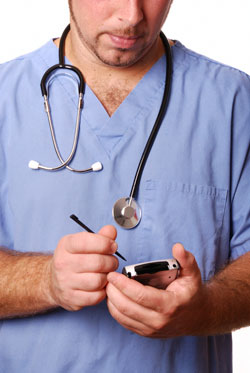Future nurses learn to provide better care using smart phones
Want better care from your doctor or nurse? There’s an app for that — actually about 8,700 of them, and they are helping future health care practitioners train to provide better patient care.
In nursing, the number of students using mobile applications is growing. At Temple’s College of Health Professions and Social Work, nursing students are required to have a smart phone equipped with software that allows them to access the most up-to-date drug information available — including drug interactions, dosing information and warnings issued by the Federal Drug Administration — wherever they are.
“In a clinical setting, nurses can’t waste time and effort flipping through a 10-year old reference book,” said Rhonda Maneval, associate chair of undergraduate nursing education. “They need that information now. We want to guide students to use this technology so that they will be better prepared when they start seeing patients as professionals.”
The Institute of Medicine estimates that up to 100,000 Americans are killed each year by preventable mishaps like medication errors, and Maneval says mobile applications might help prevent errors by providing nurses with the most current information available.
Nursing senior Amy Gargiulo was part of the first class at Temple to use the software on their smart phones, and she found the instant access helpful while doing her clinical rotations.
“It’s like the drug book for 2011,” she said. “It’s nice to have that information right at your fingertips, especially in the clinic, because it’s helpful when you need to make quick decisions.”
While some students do note that the software is a bit pricey (apps range between $115 -$285), all agree that it can be helpful. Katherine Brinton, a recent nursing graduate, says the move toward using this software is a great step for the nursing field.
“When I become a practicing nurse, I plan to have some kind of software like this on my phone,” she said. “It can only work to our advantage: we have this wealth of information that’s constantly updating, it’s portable and it’s convenient.”
In fact, more and more nursing schools are equipping their students with this technology; in requiring its nursing students to have clinical reference software on their phones, Temple joins Jefferson’s School of Nursing, Drexel’s College of Nursing and Health Professions; Northeastern Ohio University Colleges of Medicine and Pharmacy; Ohio State University College of Nursing; the University of Virginia School of Medicine and the University of California, Los Angeles.
Maneval says the benefit of students having the apps on their phones far outweighs the cost.
“Just as engineers need laptops, artists need art supplies, and architects need high quality measuring tools, nursing students will need this software to deliver the best patient care, first as students and later as highly educated members of the health care team,” she said.
